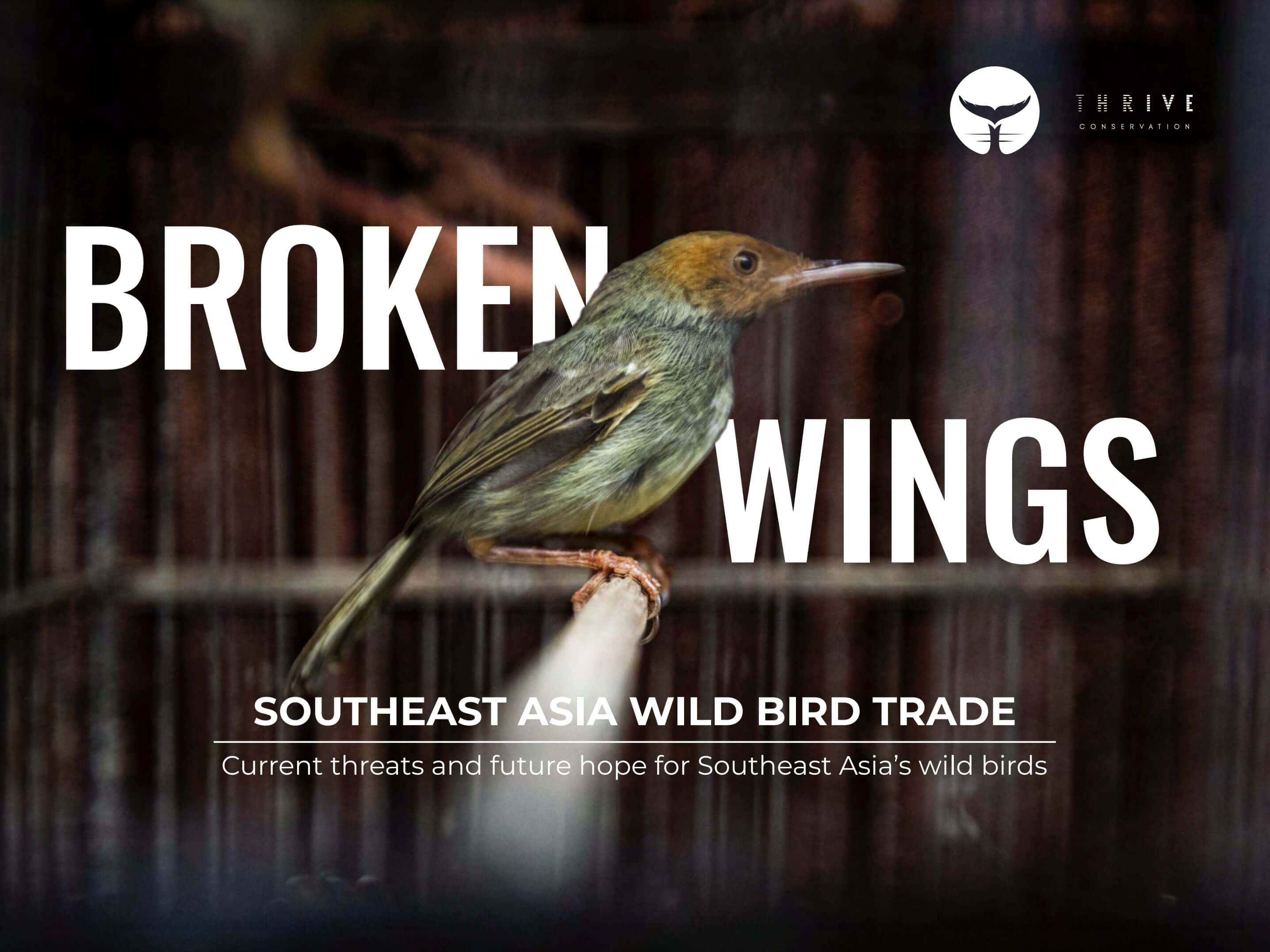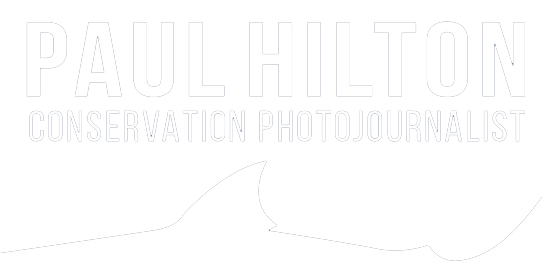Broken Wings
Protecting wild birds for people and the planet
The aim of the Broken Wings Campaign is to reduce the rate of wild bird capture across Indonesia, helping to protect bird populations – safeguarding their important role as ecosystem engineers.
“The sheer number of birds owned by people around the world is a testament to humans’ innate love and fascination for these animals. But when that love drives the demise of wild populations, it threatens the very existence of these species and the ecosystems we rely on for our own survival.“
the problem
Every year, millions of wild bird’s are taken out of their natural habitat and forced to spend the rest of their lives confined to a cage. The demand for wild birds is multifold: they are highly sought after as pets but are also hunted for their feathers, beaks, casques, meat and other body parts, for use as decoration, jewelry, food and traditional medicine.
The global wildlife trade leads to detrimental impacts for wild populations and overall ecology. It involves approximately one-third of the Earth’s bird species, making birds among the most heavily traded taxonomic groups worldwide with 1,409 species classified as threatened by the IUCN Red List, in part due to trade.
Southeast Asia is one of the most biodiverse regions on Earth. With this diversity, it is not surprising that the region represents a hub in the global wild bird market, exporting and importing all kinds of birds to and from the farthest corners of the globe.
Throughout Southeast Asia, 260 bird species are threatened with extinction, with Indonesia standing out as having more globally threatened bird species (162) than anywhere else in the world. Indonesia is also, arguably, one of the biggest players in the global wild bird market, exporting species such as parrots and hornbills, while domestically trading and even importing significant volumes of birds, in particular songbirds, driven largely by the rising trend of bird singing contests.
The associated issues of the wild bird trade have raised deep concerns in both conservation and animal welfare contexts. Birds provide important ecosystem services that are critical for people and nature to thrive, including pollination and seed dispersal for the foods that we eat. The overexploitation of wild birds is leading to the destruction of natural balances, and spread of disease.
The silencing of our natural habitats through the removal of wild birds should speak louder than words that, we too, are in trouble.
Download our Broken Wings report to learn more about the Southeast Asia wild bird trade.
Broken Wings Report
Download our Broken Wings report to learn more about the Southeast Asia wild bird trade.
“The pre-export mortality rate of wild birds in the trade is up to 90%“
The Statistics
49%
The proportion of bird species worldwide with declining populations
66-83 Million
The estimated number of birds kept in cages on Java, Indonesia; arguably exceeding the number left in the wild on the island
1 in 8
The proportion of bird species threatened with extinction worldwide
Up to 90%
The pre-export mortality rate of wild birds in the trade
The International Campaign
Although a huge global issue, few people are aware of the plight of wild birds due to the bird trade, and what this means, not only for Earth’s ecosystems, but also for humanity. We want to change that. By shining a light on this issue we hope to raise awareness and support that will drive conservation action on the ground to help save wild birds.
To kick-off this campaign, we’ve teamed up with Paul Hilton, StudioBirthplace, WaterBear Network, Universal Music and renowned composer Ludovico Einaudi, to tell the poignant story of a wild bird’s journey from capture to cage through a heartbreaking short music film.
The Opportunity
The fate of Indonesia’s bird populations, including many endemics, is still uncertain, however there is hope as regional conservation efforts have seen victories with promising recovery shown by native bird populations and improvements of critical habitats. We are also witnessing a growing number of passionate individuals, communities, organizations and governments dedicated to finding solutions that ultimately allow people and birds to thrive together. Through effective awareness campaigns and collaborative frontline conservation work, there are opportunities, such as bird eco-tourism, that could divert Southeast Asia’s passion and pride from caging wild birds to celebrating them in the wild.
Economics play a key role in driving the wild bird trade, but it also plays a key role in providing opportunities to combat it. Global wildlife tourism is worth 5.2 times more than the illegal wildlife trade, annually generating over $120 billion versus $23 billion in revenue respectively. Asia-Pacific forms the largest regional wildlife tourism market worth $53 billion in direct GDP and providing 4.5 million jobs.
Birdwatching is one of the fastest growing sectors in wildlife tourism worldwide, with an estimated three million international trips being taken every year for the purpose of watching birds in their natural habitat. In Costa Rica, for example, birdwatching generates 41% of its $1 billion tourism revenue every year, and in the United States, the total industry output of birdwatching in 2016 was estimated at $96 billion. Those who partake in the bird trade (in particular bird catchers and bird hobbyists) have a wealth of knowledge and appreciation for birds, which could be diverted away from the trade and towards birdwatching tourism, potentially generating more lucrative and sustainable income streams within this industry.
We see an opportunity to leverage upon these trends and begin driving actions that will reduce the demand for bird-keeping across Indonesia.
“God loved the birds and invented trees. Man loved the birds and invented cages” – Jacques Deval
The Action
As Indonesia is a hub for wild bird poaching in Southeast Asia, it is a critical country in which to focus and increase efforts to protect wild birds. There are still numerous conservation gaps where further efforts are needed to address the issues around the wild bird trade. Thrive Conservation will step into some of these gaps and develop a multifaceted long-term program to create positive change for Indonesia’s birds, their environment and the people that are involved within the wild bird trade.
Our ultimate aim is to reduce the rate of wild bird capture across Indonesia. We will launch this mission through execution of the following two objectives.
Objective 1.
Develop a nationwide demand reduction campaign in Indonesia that will change consumer purchasing decisions and behavior away from buying and keeping wild-caught birds.
This objective goes beyond awareness raising and education, and really aims to change human behavior. We will utilize multiple communication channels to target key user groups of wild birds with strong and innovative messaging to raise awareness on the impact of declining wild bird populations and work on shifting the practice of buying and keeping wild birds in cages. Each user group will require a different communication medium, tone and approach – one that is tailored to resonate with the target audience, and is in accordance with their economical, socio-political and cultural context.
A successful demand-reduction campaign across Indonesia will:
- Reach key user groups of wild birds through multiple communication channels
- Raise awareness on the detrimental impacts of removing birds from the wild and the legal consequences of engaging in the illegal wild bird trade
- Encouraging individuals to pursue alternative livelihood opportunities to the illegal wild bird trade
- Help the development of new, and strengthen the enforcement of existing, laws and regulations
- Foster a culture that is more mindful towards the natural environment and its inhabitants, where individuals prioritize the long-terms impacts of their choices over short-term gratification
- Help develop new social norms around the treatment and welfare for captive birds
- Uncover passionate local bird champions and ambassadors who will help amplify the campaign messaging.
Objective 2.
Elevate birdwatching ecotourism in Bali to provide alternative livelihood options for bird poachers and traders, and to shift consumer demand from bird keeping to birdwatching.
Birdwatching has the potential to generate vast economic benefits, especially for remote communities where employment opportunities are limited. This may provide alternative income streams for local communities, with the potential to replace destructive livelihoods and support habitat protection, adding to the conservation benefits of this type of tourism. Boasting the highest number of endemic bird species (522) in the world, Indonesia has the potential to build a booming birdwatching industry.
However, to capitalize on this growing market, Indonesia would need to offer what birdwatchers require, including safety, accessibility, infrastructure, quality of birdlife, and knowledgeable guides. Thrive Conservation sees an opportunity to develop birdwatching here as a means to shift behavior from trading birds, to enjoying them in their natural habitat. As Bali is a well developed tourism destination and home to numerous unique bird species including the endemic and iconic Bali Starling, we believe it is a perfect site to develop birdwatching as a pilot to be replicated across the archipelago.
Successfully elevating the birdwatching tourism industry in Bali will:
- Provide alternative sustainable livelihoods for ex-bird catchers and traders
- Help to redirect Indonesia’s love for birds from bird-keeping to birdwatching
- Drive a higher monetary value on wild birds as they become a valuable ecotourism asset
- Instill local pride and understanding of wild birds and their importance in the ecosystem
- Potentially lead to stricter enforcement of illegal wild bird trade as Bali begins to appreciate and value wild birds
- Provide a model that could be expanded and replicated in other regions of Indonesia
- Showcase the successful Bali Starling breeding & repopulation program as a ‘conservation win’, instilling local pride and fostering behavior change.
Get Involved
Join the flock of passionate bird lovers uniting to save our wild birds from disappearing.
Donate.
Make a donation (monthly or one off) to help us execute and sustain our frontline bird conservation actions in Indonesia.
Educate.
Educate yourself and others by watching and sharing the Broken Wings short film and other media related to the wild bird trade.
Conscious consumerism.
Don’t purchase wild caught birds or their products.
Do you have a unique collaboration or fundraising idea? We love creating tailor-made partnerships with passionate individuals, corporations, and organizations.
Please contact us to discuss opportunities to help the planet and people thrive.










